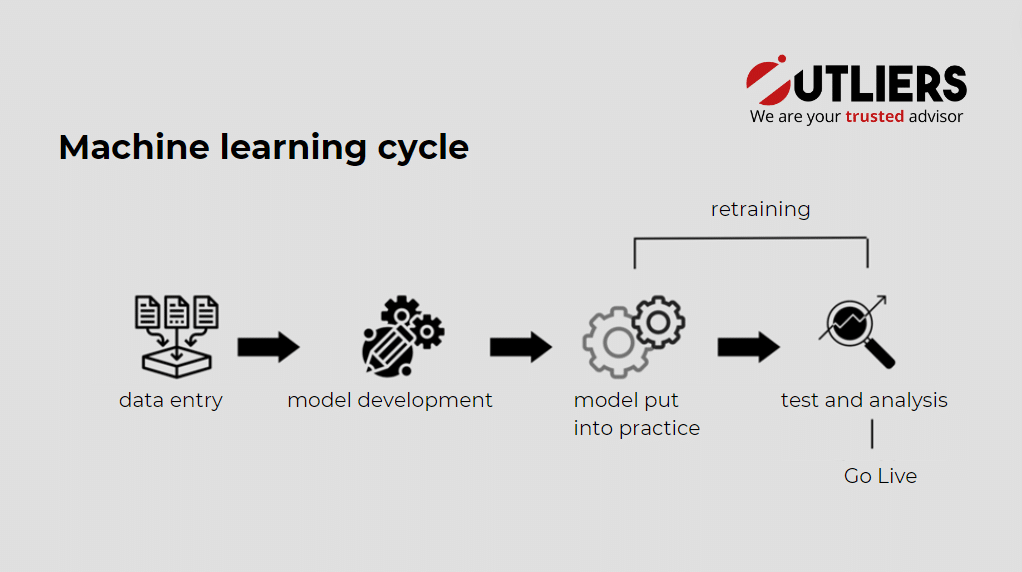Machine learning is a subset of artificial intelligence that allows computers to learn from data and improve their performance on a task without being explicitly programmed.
Machine learning algorithms are basically designed to classify things, find patterns, project results, and make informed decisions. The algorithms can be used one at a time or combined to achieve the highest possible accuracy when dealing with complex and more unpredictable data.
In other words, it is a way for computers to “learn” from data and make predictions or decisions based on that learning.

Did you know that in 1950 the mathematician Alan Turing first raised the possibility that machines could think?
How is machine learning applied to the sales operations?
1. Predicting customer behavior
If you have ever bought clothes online you probably noticed the brands have very smart cross-selling strategies. When you buy a pair of pants, you generally receive an email with similar pants in another color or maybe another popular item for other customers who chose the same pants.
Machine learning helps companies to analyze customer data to identify patterns and make predictions about their behavior. This way you can anticipate customer needs and adapt the sales strategy.
2. Optimizing prices
Have you ever wondered why the flight tickets prices always change?
Well, airlines use machine learning to adjust ticket prices based on factors such as time of day, day of week, and number of seats available. This way they can maximize revenue by charging higher prices during peak travel periods and lower prices during off-peak periods.
Machine learning helps companies identify the optimal price for your products or services, which will help you maximize profits and remain competitive. Additionally, this allows you to offer personalized discounts and promotions that drive sales and increase customer loyalty.
3. Automating tasks
Automating repetitive tasks like lead scoring, email marketing, and customer segmentation is now a dream come true. This means your sales team’s can focus on higher-value activities such as in-person meetings, preparing a sales proposal or delivering a webinar that drive sales.
4. Improving sales forecasts
Of course, you could export your sales information in an excel to analyze what are your low or high months, identify your average sales ticket etc… but wouldn´t it be so much better to use your time in creating sustainable strategies?
Machine learning algorithms are used to analyze time series data, such as daily or weekly sales data, to identify patterns and trends over time.
This helps companies forecast future sales based on historical trends and seasonality. For example, retailers can forecast sales during holiday seasons based on previous sales data during the same period.
This means sales leaders make better business decisions and allocate resources more effectively.
5. Creating personalized customer experiences
You can create personalized customer experiences by analyzing data, such as:
- Customer segmentation: create groups of customers based on their interests, location, preferences and behavior. This allows you to tailor marketing efforts and offer personalized recommendations for each segment.
- Recommendation engines: Machine learning can power recommendation engines that suggest products and services to customers based on their browsing and purchasing history. This can increase the likelihood of cross-selling and customer loyalty.
One of the best-known platforms that work with this function is SAP CPQ , which allows you to create automated quotes based on the client’s needs.
- Chatbots: Create intelligent chatbots that can provide customer service and support, as well as use natural language processing to understand customer queries and offer personalized responses.
Conclusion
By harnessing the power of machine learning, you can stay ahead of the competition, improve user experience, and drive business growth.
Start making decisions based on data and improve the efficiency and effectiveness of your sales office.
If you need assistance in putting a cohesive sales tech stack together, see our list of Total Sales Transformation Softwares.

Navigating through maturity levels in incentive, bonus, and commission management
Know the levels of maturity in managing incentive, bonus, and commission management, key concepts for proper compensation.

Know what the lead-to-cash cycle is
Learn more about the lead to cash cycle and discover its stages to achieve the attraction of potential clients, up to the completion.

Predictions of Artificial Intelligence in Sales Bonuses and Commissions Management
Discover the significant benefits of using Artificial Intelligence in sales commissions and bonus management for your company.

Decoding the Nuances of Sales Team Motivation: Mastering ACV and Quotas
Understand the nuances of measuring Annual Contract Value and learn effective strategies to motivate sales teams for revenue growth.

Mastering Predictable and Repeatable Revenue: The Foolproof Recipe
Nothing is more dynamic than sale and understanding and predicting volatility can be a game-changer for building a growth engine.


